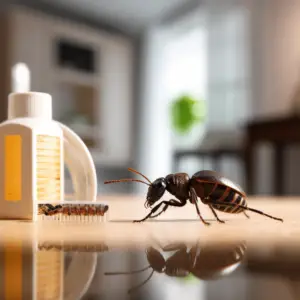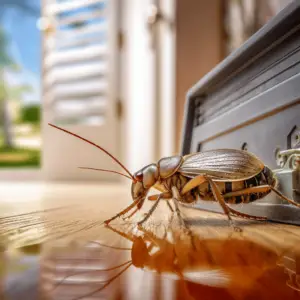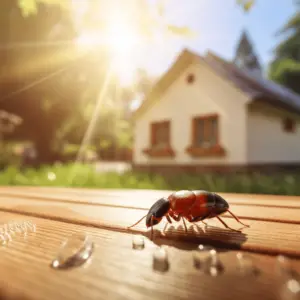Pest prevention, Pesky intruders in our homes can be a real hassle. Fortunately, there are ways to keep them out and make your home pest-free! From closing any cracks in walls to having food properly sealed, here’s how you can protect your home.
Pests are not only unsightly but also a health hazard. To prevent this, keep your house clean and get rid of any food that attract pests. Also, ensure all doors, windows, and walls are sealed and no tiny openings are left.
To further boost your pest prevention efforts, install screens on doors and windows to stop any flying pests. Regularly inspect for signs of pests such as droppings or chewed wires to identify the problem quickly, and take necessary action.
Moreover, note that different pests require unique measures. For instance, use treated wood or implement moisture controls to keep termites away. On the other hand, use caulk or natural ant repellents to deter ants.
The National Pest Management Association (NPMA) tells us that mice can squeeze through holes as small as a dime! Therefore, stay alert and address any vulnerabilities in your home right away to keep pests away.
By following these preventive measures, your Pest prevention will be safe from unwanted visitors. So get started and protect your home!
Table of Contents
Understanding Common Household Pests

Pests in the home can be a nuisance and a risk. To avoid them, it’s essential to understand the common household pests. Here are four of them: rodents, insects, termites, and mosquitoes.
Rodents have sharp teeth that always grow, so they gnaw on things. Ants can communicate via pheromones. Bedbugs are active at night and feed on blood. Mosquitoes lay eggs in standing water.
To prevent pests, here are some tips:
- Seal cracks with caulk or weatherstripping to stop rodents.
- Keep the kitchen clean to stop ants and cockroaches.
- Check for termite damage, call a pro if there is any.
- Remove standing water for mosquitoes.
By understanding these pests and taking action, you can protect your home.
Identifying Entry Points
To keep pests from invading your home, finding their entry points is key. Find and block the areas they use to get in. Cracks in walls, gaps in windows, gaps under doors, and vents are their typical access points. Inspect your home thoroughly to spot any other weak spots they could use. Remember, regularly checking and addressing entry points is the best way to prevent pest infestations!
Prevention Methods

Stop pests from entering your home by sealing up any cracks in windows, doors, and walls.
Clean up your kitchen frequently – wipe countertops, clean spills, and store food in airtight containers.
Plus, dispose of trash regularly and make sure to have lids that fit tightly on cans.
Eliminate moisture sources, such as leaky pipes or faucets, to avoid unwanted critters like cockroaches or silverfish.
Trim overgrown vegetation close to the house, as it may provide a hiding spot for pests.
Install window screens to keep flying insects out while allowing fresh air in.
Also, use weatherstripping around doors and windows to create a tight seal, blocking out any pests.
By following these precautions and tips, you can ensure a pest-free living environment!
Natural Remedies for Pest Control
Natural solutions for pest control are available. Here are five ideas to repel them:
- Close all holes and crevices. Pests may enter your home through small gaps. Seal any broken walls, floors, and windows.
- Use peppermint oil. Ants and spiders don’t like it. Put a few drops near entry points.
- Keep your space tidy. Remove food and clutter; it can attract pests. Cleanliness reduces their chances of infesting.
- Vinegar and water. Mix equal parts and spray it on areas where ants are seen. This disrupts their scent trails.
- Install mosquito-repelling plants. Lavender, citronella, and marigolds keep mosquitoes away. Plant them in your garden.
Remember: Natural remedies may not always solve big pest issues. Pest prevention could be best to consult a specialist for thorough extermination.
Pro Tip: For best results, use multiple methods instead of one. This way, you can reduce the need for chemical treatments and get better pest control outcomes.
Professional Pest Control Services

Expert techs inspect and spot pests and their entry points for sure-fire removal. Advanced pest control strategies are used to terminate infestations, blocking future breakouts. Custom plans are designed for the unique needs of your home, assuring optimal results. Monitoring and preventive steps are taken to keep your abode pest-free.
Plus, pro pest control services offer many perks – like eco-friendly solutions that secure your family and pets.
True Story:
My friend had a gigantic termite issue in his new house. He tried many DIY methods but failed. As a final measure, he contacted an expert pest control service. Their experts identified the harm and eliminated the termites using safe treatments. Pest prevention saved my friend’s residence from further damage and gave him peace of mind.
Conclusion
Pests can be a huge nuisance in any home, but there are ways to keep them away. To create an unpleasant environment for pests and maintain a pest-free home, try using these tips.
- Good sanitation is a must. Clean your living space regularly, throw away trash quickly, and store food in sealed containers. Pests are attracted to crumbs and food left out, so keeping your house tidy will keep them away.
- Block off any entry points. Fix cracks in walls and foundations, repair windows and doors screens, and install door sweeps.
Another helpful method is using deterrents such as essential oils or strong-smelling plants. For example, peppermint oil repels spiders, and marigolds around your property can stop mosquitoes from breeding.
In addition, consider regular Pest prevention control measures. Hire a professional exterminator or use over-the-counter products. Read and follow all instructions for safe and effective use.
Also, address any existing pest problems right away. Ignoring the issue will only make it worse and cause more damage. If you see signs of pests, take action immediately to avoid a bigger problem.
By following these suggestions and proactively dealing with pest control, you can keep pests out of your home. Prevention is key in keeping pests away and maintaining a safe and clean living environment for you and your family.
Frequently Asked Questions
Q: What are some common pests that can invade my home?
A: Common pests that can invade your home include rodents (rats and mice), insects (ants, cockroaches, and termites), spiders, bed bugs, and mosquitoes.
Q: How can I prevent pests from entering my home?
A: To prevent pests from entering your home, make sure to seal all cracks and openings, repair damaged screens, keep your living space clean and clutter-free, store food in airtight containers, and regularly dispose of garbage properly.
Q: Are there any natural remedies to keep pests away?
A: Yes, there are natural remedies to keep pests away. Some examples include using essential oils like peppermint oil to repel rodents and insects, using vinegar to clean surfaces and deter ants, and using diatomaceous earth to control bed bugs and other crawling insects.
Q: Should I hire a professional pest control service?
A: It is recommended to hire a professional pest control service if you have a severe infestation or if your efforts to control pests on your own have been unsuccessful. Professionals have the knowledge, experience, and tools to effectively eliminate and prevent pest problems.
Q: How often should I inspect my home for potential pest issues?
A: It is advisable to regularly inspect your home for potential pest issues at least once every season. This will help you identify any signs of pest activity early on and take necessary preventive measures.
Q: What should I do if I find signs of pests in my home?
A: If you find signs of pests in your home, such as droppings, gnaw marks, or insect activity, you should immediately take action. Thoroughly clean the affected areas, seal any entry points, use appropriate traps or baits, and consider contacting a professional pest control service for assistance.
